Dead Man Walking @ 25: Susan Sarandon's long road to the Oscar
 Tuesday, December 29, 2020 at 11:31PM
Tuesday, December 29, 2020 at 11:31PM 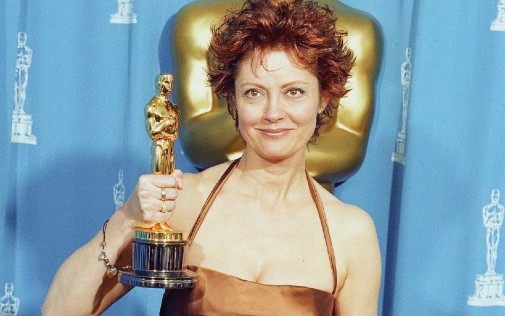
25 years ago, Tim Robbins' Dead Man Walking opened in theatres. The film dramatizes the true story of Sister Helen Prejean, the close relationship she forged, as a spiritual adviser, with convicted murderers on death row. Here, they are made into the composite fictional figure of Matthew Poncelet. Susan Sarandon and Sean Penn take on the lead roles, delivering two of the best performances of their respective careers. He received his first Oscar nomination out of it. She was honored with her fifth nod and, presently, her last. And she finally won the Best Actress trophy.
The actress may be a controversial figure, but I'm not here to litigate her politics or the way she chooses to express them. Instead, I'd like to look at her achievements as a performer, specifically the five works that paved the way to that triumph on the night of the 67th Academy Awards. Join me – won't you? – as we explore Susan Sarandon's long road to the Oscar…
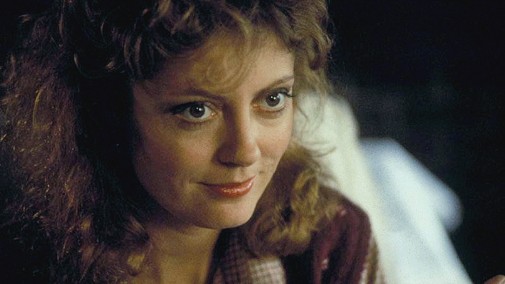
ATLANTIC CITY (1981)
Louis Malle's elegy for the gangster genre is like a romance steeped and fermented in despair. Focused on an aging criminal played by Burt Lancaster and a young waitress played by Sarandon, the film sings a sad song, one that speaks of crumbling playgrounds, a city in decay, past prosperity rotting into nothingness. It's the kind of subdued character study that seldom gets the attention of AMPAS, making its five nominations, including for Best Picture, into a precious anomaly. While I wouldn't call Sarandon the best of her lineup – that honor belongs to Diane Keaton in Reds – she's certainly worthy of the nod.
After spending the 70s starring in such outlandish and controversial pictures as The Rocky Horror Picture Show and Pretty Baby, one might have expected that Sarandon would do her best work in a stylized register. In Atlantic City, however, she takes the path of naturalism, full of grace notes and marrow-deep exhaustion, little nervous movements, aborted gestures, a sensuality so casual we feel like voyeurs for looking upon her. Best of all, her rapport with Lancaster vibrates with inchoate chemistry, strange feelings swirling around each interaction, never resolving themselves in uncomplicated ways.
Sarandon lost to Katharine Hepburn in On Golden Pond, a record-breaking fourth Best Actress win that's unlikely to be bested.
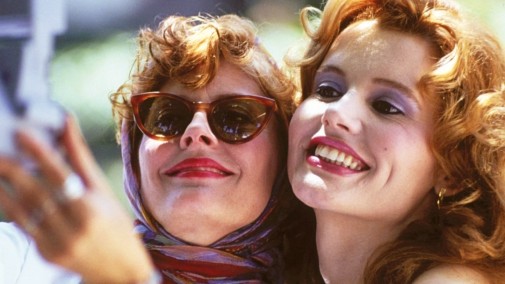
THELMA & LOUISE (1991)
What more can one say about Thelma and Louise? Directed by Ridley Scott and written by Academy Award winner Callie Khouri, the film's a modern classic, a spin on the road movie, and a crime spree narrative that puts women at the wheel. What starts as the odyssey of two longtime friends is transformed by an attempted rape and a death, turned into a chase for the history books. Lesser artists would perchance lionize the titular characters, sacrificing their humanity to get at some mythic idea of heroism. Thankfully, the makers of Thelma & Louise don't commit such mistakes.
As Louise, Sarandon has to control most of the picture's tonal shifts, handling them with steely resolve while Geena Davis explodes in pain, lust, joy, and joie de vivre. There's a shadow to Louise's demeanor from minute one, and, as the narrative unfolds, we see how detailed Sarandon's characterization is, how she suggests an entire life that happened off-screen but informs every on-screen decision. In a rare avoidance of category fraud, AMPAS nominated both Sarandon and Davis for their complementing performances, each genius in their own right but beyond perfect when put together. Considering Sarandon had just been snubbed a few years prior for her sexy turn in Bull Durham, it's particularly nice to see her being part of one of the few Best Actress pairs in Oscar history.
The winner that year was Jodie Foster, earning her second Oscar for The Silence of the Lambs. It's hard to argue with the result, but this is the sort of race that makes one long for ties.
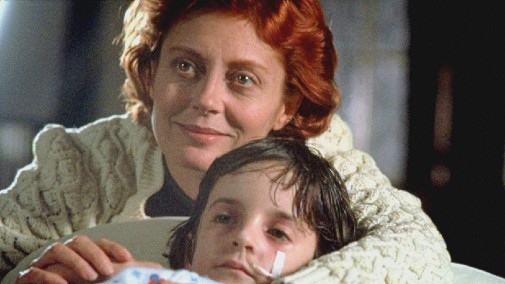
LORENZO'S OIL (1992)
Before he ever stepped into the Thunderdome or made penguins tap-dance, George Miller was a physician. That vocation surely influenced his work on Lorenzo's Oil. The picture's the dramatization of the real-life events surrounding the parents of a child suffering from adrenoleukodystrophy, their struggle to find a cure, their relentless efforts to improve the kid's quality of life. While the premise may make it sound like commonplace prestige fare, Miller shoots Lorenzo's Oil with maddening style, elevating the medical drama to a heightened register, closer to opera than to Oscar bait.
Still, the film did get some love from the Academy, including a Best Actress nomination for Sarandon. While avoiding the broader acting choices of her costar Nick Nolte, she doesn't necessarily play the aggrieved mother with subtlety. Instead, it's a feat of calcinating emotion. Even silent reaction shots seem to shout in agony, in love, in ragged hopefulness. Sarandon's beautiful big eyes have never looked as huge as they do here, when her gaze is tearful, her brow wet, her voice trembling through words of comfort to a little kid in unimaginable pain.
Emma Thompson won the Best Actress trophy of 1992 for her heartfelt work in Howards End. Considering the nominees, the Academy's decision was right.
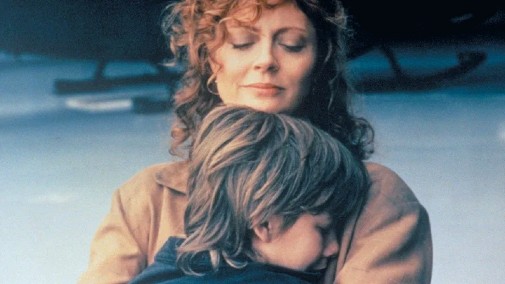
THE CLIENT (1994)
The 1990s were the decade for John Grisham adaptations, the popular stories making for box office triumphs. As you can imagine, it was also the decade of Susan Sarandon, at least the first half. No wonder that, when the two forces converged, the result was a movie that made big money and charmed a good percentage of the moviegoing public. In other years, this sort of crowd-pleaser about a brave attorney and the little boy she vows to protect would have been quietly ignored by the Academy. However, as far as AMPAS-friendly titles were concerned, 1994 was a "weak" year for the Best Actress category.
It's, by far, the least impressive of Sarandon's nominated performances, being mostly comprised of her usual tricks and well-oiled strategies. She projects intelligence with a trademark indefatigable stare before morphing into beatific insolence, playing maternal notes and then flashing fear, a heroine who's still too human and too green to be fearless. One wishes the actress had added some discordant notes to her characterization, some abrasiveness to cut through the sentimentality, perhaps an authentic hint of addiction, a genuine meanness. Overall, it's a solid effort and not a nomination anyone should be ashamed of, but hardly a highlight in the actress' rich filmography.
Though few watched Blue Sky, Jessica Lange was the victor of 1994, scoring her second statuette and her first Best Actress Oscar.
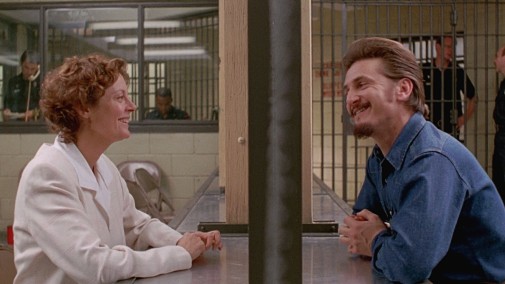
DEAD MAN WALKING (1995)
At last, we arrive at the movie and performance that got the star her gold. In many ways, Sister Helen represents a typical Sarandon performance in some ways, though the actress' regular charge of earthy eroticism is hidden under a veil of religious piety. Which is not to say that she's not on autopilot. Neither the script nor her director (and husband, at the time), allow for such mindless passivity, demanding complexity and devotion from the performer. What's most notable about Sister Helen is how much she's a reactive figure, a supporting character within her own story.
She exists as an advisor, a calming presence, an island of serenity for a man facing the crashing wave of death. It's easy to imagine the same basic plot sidelining her, making the lensing of Dead Man Walking all the more disconcerting. Robbins fixes his camera on Sarandon's face, forcing us to stare into her eyes, to see her assimilate information, her reckoning with harsh truths, and the moral quandaries of the situation. She's our guide and companion into the film's world, the reflection of the audience as well as a paragon of empathy made flesh. Neither beatific icon nor blank canvas, she's painfully human, aching, perfectly imperfect.
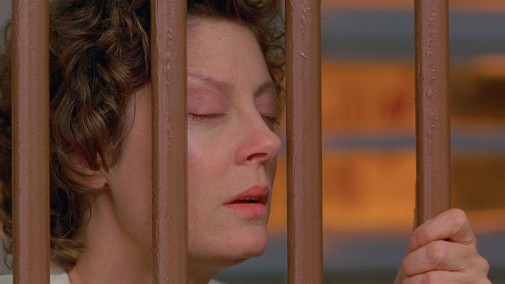
What's most fascinating about the work is the craft present in the intelligent variations of mood and expression. Sarandon could have played it as an unbending force, but she allows Sister Helen to fluctuate in allegiance and resolve, to laugh in an unjust world, to smile when nervous, to forget her serene mask for a second and reveal a glimpse of ugly shock, revulsion, even disgust. Seeing her negotiate a confrontation with the parents of one of Matthew's victims is excruciating because Sarandon allows Helen to appear lost, she lets the audience see a dilemma and offers no solution, no neat conclusion or catharsis.
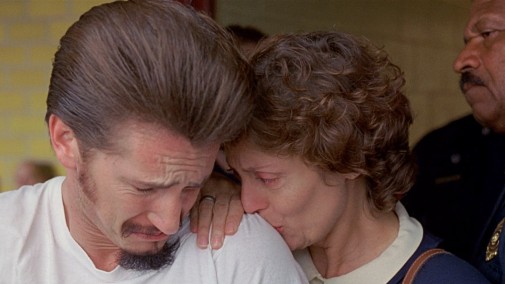
Near the end of the movie, Sister Helen proclaims her actions don't necessarily stem from faith but work. Sarandon illuminates the effort of goodness, the difficulty in opening one's heart to a dying man in need of support, the challenge that is defending one's beliefs when they come against the undeniable agony of others. Some may claim this results in cerebral insularity, the mechanical labor of performing laid bare in strenuous facial gymnastics. That may be true, but I still confess myself riveted by what Sarandon achieves, how well she masters the art of listening on-screen, a task much trickier than it first appears.
This was a titanic Best Actress race, and most of the nominees would have made worthy winners including Sarandon. But my pick would be either Streep in Bridges of Madison County or Shue in Leaving Las Vegas.
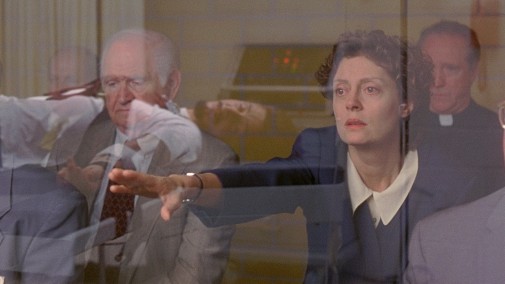
If you could decide the fates of Oscar, what would Susan Sarandon's tally look like? Did she deserve to win in 95?



Reader Comments (52)
We'll never know but I think she won by a lot despite the amazing competition. Casino and Bridges were not liked (1 nomination each), Emma had the screenplay award in the bag and Shue was too "new".
Personally, SARANDON has never done anything for me and she kinda annoys me; 1995 was an incredible line-up but I would've easily replaced her with Kidman, Bates or Moore. STONE should've won for CASINO she's a tour de force and she followed the act with ace performances in LAST DANCE, DIABOLIQUE and THE MIGHTY. SHUE was fantastic as well.